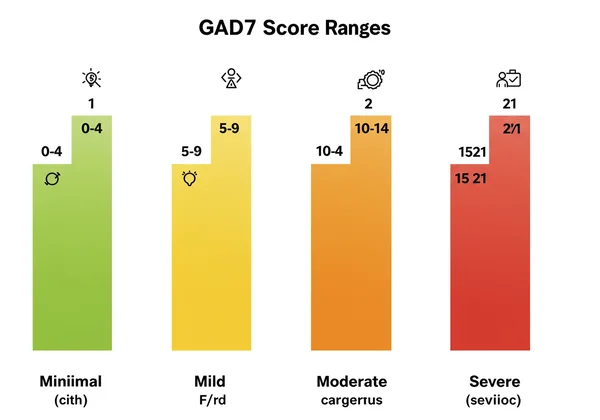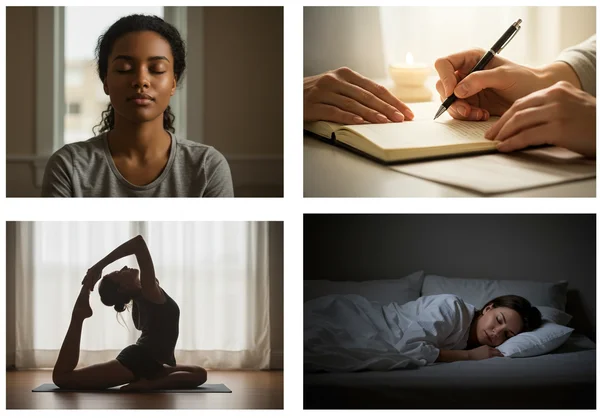Your GAD7 Score: Next Steps & When to Seek Help
July 21, 2025 | By Fiona Hayes
Receiving your GAD7 score is a significant first step toward understanding your mental well-being. It’s a moment of clarity that can feel both empowering and a little daunting. You might be looking at your number and asking, what does my GAD7 score mean? That’s a completely normal and important question. Think of this article as your supportive guide, here to provide clear, actionable advice on interpreting your results, using personalized insights, and knowing when professional support is the right next step. Armed with this knowledge, you can move forward with confidence.
Taking the first step is often the hardest, but you've already done it. If you haven't yet, you can get your GAD7 score quickly and confidentially on our platform. The journey to managing anxiety is about understanding, and your score is a powerful starting point. It’s a piece of data—a flashlight in the dark—meant to illuminate the path forward, not to define you. Let's explore what comes next.

Understanding Your GAD7 Score: What It Truly Means
Your GAD7 score is more than just a number; it’s a snapshot of your experience with anxiety symptoms over the last two weeks. The GAD7, or Generalized Anxiety Disorder 7-item scale, is a trusted screening tool used by professionals worldwide. It helps quantify feelings that can often seem vague and overwhelming. Understanding this score is key to taking informed and effective action.
Deciphering Your GAD7 Score Ranges (Mild, Moderate, Severe)
The GAD7 questionnaire is scored out of 21 points. Each of the seven questions is scored from 0 (not at all) to 3 (nearly every day). These points are added up to give you a total, which typically falls into one of four categories. Understanding the GAD7 score ranges helps put your result into context:
-
0-4: Minimal Anxiety. A score in this range suggests that you are likely experiencing few, if any, symptoms of anxiety.
-
5-9: Mild Anxiety. This score indicates the presence of mild anxiety symptoms. While they may be noticeable, they are likely manageable.
-
10-14: Moderate Anxiety. Scores in this range suggest that anxiety symptoms are consistently present and may be impacting your daily life. Further evaluation is recommended.
-
15-21: Severe Anxiety. A score in this category indicates significant and frequent anxiety symptoms that are likely causing considerable distress and impairment. Seeking professional help is strongly advised.

Is the GAD7 a Diagnosis? Clarifying Its Role
Let's clear up one of the most critical points: Is the GAD7 a diagnosis? The simple answer is no. The GAD7 is a highly effective and scientifically validated screening tool, not a diagnostic instrument. Think of it like a smoke detector; it alerts you to the potential presence of a fire (anxiety), but it doesn't tell you the cause or size of the fire. That requires a firefighter (a healthcare professional) to investigate.
The purpose of the generalized anxiety disorder 7 item scale is to identify and measure symptoms that may warrant further attention. A diagnosis for an anxiety disorder can only be made by a qualified professional, such as a doctor, psychologist, or psychiatrist, after a comprehensive evaluation. Your score is a valuable piece of information to bring to that conversation.
Your GAD7 Next Steps: Actionable Self-Care & Initial Strategies
Receiving your score is the beginning, not the end. The next phase is about action. Depending on your score, your GAD7 next steps can range from implementing simple self-care techniques to seeking professional guidance. The goal is to build a supportive framework for your mental health, starting today.
Everyday Self-Care Techniques for Anxiety Management
Regardless of your score, building self-care into your routine can make a real difference. For those with mild symptoms, these practices can make a significant difference. For those with higher scores, they are an essential complement to professional treatment. Here are a few evidence-based ideas on how to reduce anxiety:
-
Mindful Breathing: When you feel anxious, your breathing often becomes shallow and rapid. Practice slow, deep belly breaths for a few minutes. Inhale for four counts, hold for four, and exhale for six. This activates your body's relaxation response.
-
Journaling: Externalize your worries. Write down what's on your mind without judgment. This can help you identify anxiety triggers and create distance from spiraling thoughts.
-
Movement: Physical activity is a powerful anxiety reducer. A brisk 20-minute walk, a yoga session, or a quick dance break can release endorphins and reduce stress hormones.
-
Prioritize Sleep: Anxiety and sleep have a complicated relationship. Aim for a consistent sleep schedule and create a relaxing bedtime routine to improve your sleep quality.

Leveraging Your Personalized AI Report for Deeper Insights
One of the unique features available after you complete a GAD7 assessment on our site is the option for an AI-powered personalized report. This goes far beyond the standard score interpretation. It analyzes your unique response patterns to provide deeper, actionable insights into your personal strengths, potential challenges, and how your symptoms may be affecting your daily life.
This report is a key "next step" as it transforms your GAD7 score from a simple number into a personalized roadmap. It offers tailored suggestions and helps you understand the nuances of your own experience, making it an invaluable tool for self-reflection and for preparing to speak with a professional.
When to Seek Professional Anxiety Help: Key Indicators
Knowing when to reach out for help is a sign of strength and self-awareness. While self-care is important, it is not always enough. It’s important to know the signs that suggest it's time to seek anxiety help from a professional.
Recognizing Signs That Warrant Professional Support
Consider seeking professional support if you experience any of the following:
- Your GAD7 score is in the moderate to severe range (10 or above).
- Anxiety is significantly interfering with your work, school, or relationships.
- You experience frequent panic attacks or feel constantly on edge.
- You are using unhealthy coping mechanisms, such as substance use, to manage your feelings.
- Self-help strategies are not providing enough relief, and your symptoms are worsening.
If these feel familiar, it is time to connect with a healthcare provider. Your GAD7 score can be the perfect, objective starting point for that important conversation.

Preparing to Discuss Your GAD7 Results with a Professional
Walking into a doctor's office to talk about mental health can feel intimidating. Being prepared can make the process much smoother. Your GAD7 questionnaire results are an excellent tool for this.
Bring a copy of your score or your AI personalized report. It provides a clear, concise summary of your recent experiences. Be ready to talk about how your symptoms affect your life. The more specific you can be, the better your doctor can help. Remember, they are there to support you, and this data helps them do their job effectively.
Exploring Mental Health Resources & Continued Support
Once you decide to seek help, it's useful to know what kind of mental health resources are available. The world of mental health support is vast, and there is a path that is right for you.
Understanding Different Types of Mental Health Professionals
The terminology can be confusing, but here’s a simple breakdown:
- Psychiatrists: Medical doctors (MDs) who can diagnose mental health conditions and prescribe medication.
- Psychologists: Professionals (Ph.D. or Psy.D.) who specialize in therapy (talk therapy) and psychological testing.
- Therapists/Counselors: Master's-level professionals (LCSW, LMFT, LPC) who provide therapy and counseling.
Finding Reputable Mental Health Services and Support Networks
Finding the right support starts with knowing where to look. You can often get a referral from your primary care physician. Many national organizations, like the National Alliance on Mental Illness (NAMI) or the Mental Health America (MHA), offer directories and local resources. The first step is to take the GAD7 test to get a clear picture of your needs.
Your Journey Forward: Taking Action for Well-being
Your GAD7 score is a vital step, not the finish line. It offers the clarity you need to take meaningful action. Whether you choose to practice mindful breathing, explore your personalized AI report, or schedule an appointment with a professional, you're actively shaping your path toward greater well-being. Remember, every step forward counts.
Use this new understanding to advocate for your health and build a life where anxiety feels manageable. We're here to support you every step of the way with resources available on our site. Ready to begin? Take the free online GAD7 test today. We'd love to hear your thoughts or experiences in the comments below—sharing can genuinely help others feel less alone.
Common Questions About Your GAD7 Score & Moving Forward
What are the GAD7 score ranges for mild, moderate, and severe anxiety?
The standard GAD7 score ranges are: 0-4 for minimal anxiety, 5-9 for mild, 10-14 for moderate, and 15-21 for severe anxiety. These categories help contextualize your symptoms, but a professional consultation is needed for a full picture.
Is the GAD7 test a diagnostic tool for generalized anxiety disorder?
No, it is not a diagnostic tool. The GAD7 is a clinically validated screening questionnaire used to measure the severity of anxiety symptoms. A formal diagnosis must be made by a qualified healthcare professional after a comprehensive evaluation.
What should I do if my GAD7 score is high?
If your score is in the moderate to severe range, it's a strong indicator that you should speak with a doctor or mental health professional. Use your score and our AI Personalized Report as a starting point for that conversation. In the meantime, focus on gentle self-care and remember that help is available.
How accurate is the GAD7 test in screening for anxiety?
The GAD7 is considered a highly reliable and accurate screening tool for identifying symptoms of Generalized Anxiety Disorder and other anxiety conditions. It is widely used and respected in clinical and research settings for its accuracy in flagging potential issues for further review.
Can lifestyle changes truly reduce anxiety symptoms?
Absolutely. For many individuals, especially those with mild to moderate symptoms, lifestyle changes like regular exercise, a balanced diet, sufficient sleep, and mindfulness practices can significantly reduce anxiety. They are also a critical component of any comprehensive treatment plan for more severe anxiety. A great way to measure your progress is to check your GAD7 score periodically.